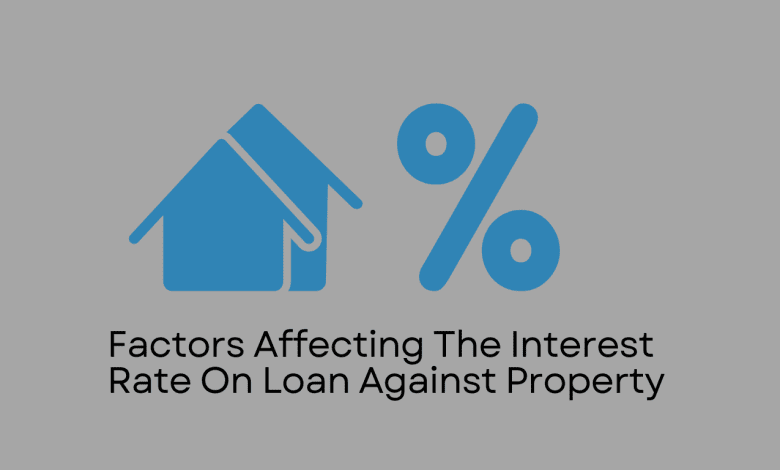Factors Affecting The Interest Rate On Loan Against Property

We continually make an effort to ensure that we are financially secure, whether it is through maintaining a sufficient amount of assets in our savings accounts, making wise use of our credit cards, or investing in the right funds or shares. However, we must never undervalue an emergency since it may undo any protections we have put in place. Most people in these situations look for a personal loan to cover unexpected expenses. However, if the demand is great, there is also a superior alternative. You can obtain a mortgage, often known as a loan against property (LAP).
A loan against property may be used to meet a variety of financial needs. It can help you with anything, including starting a new business or buying a new house. Understanding the variables that affect the loan against property interest rate is crucial. Here are some more factors that may have an effect on the property loan interest rate.
Credit score
Your credit score, which is a three-digit value between 300 and 900, shows the lender how trustworthy you are. Your risk ratio decreases as your credit score rises. To get a good interest rate, a credit score of at least 700 is preferred.
When determining a person’s eligibility for a loan and the interest rate that will be charged, their credit score is crucial. Any score over 650 is regarded as sufficient to obtain competitive rates on loans secured by property in the market. Because lenders view customers with low credit scores as high-risk, they approve loans for them at higher interest rates.
The financial profile of an applicant
The percentage of interest and loan eligibility are both impacted by the borrower’s profile. Lenders evaluate your application. They consider your age, kind of employment, source of income, type of residence, prior borrowing history, and other factors. A senior citizen who is close to retirement may not qualify for a loan. If they do, the interest rate will be significantly higher. They might possibly receive a loan with a shorter term, which would require them to pay a very high EMI each month. A person who makes less money will also pay more interest on loans secured by the property since they present a greater risk of default to the lender.
Type of property
The kind of property that has been used as collateral for a loan is very important to lenders. The property is inspected by surveyors employed by the lenders. They determine its type (whether residential or commercial), age, location, and market worth. The amount of the loan that can be accepted, the time frame for repaying the loan, and the interest rate that can be charged to the borrower are all determined by the lenders based on the surveyors’ reports. Different loan amounts and interest rates apply to commercial and residential properties, respectively. Old and worn-out buildings will have reduced property values, which could lead to loans being accepted for smaller amounts with higher interest rates.
Loan tenure
The rate of interest that will be charged on the loan is also based on how long it will be outstanding. Due to the lengthier repayment terms for these loans—roughly 15-20 years—the provided interest rate is lower. By choosing a shorter tenure, the borrower has the option of paying off the debt earlier. But in these circumstances, the lender typically charges a higher interest rate on the loans secured against property.
Tax benefits
The inability to claim tax benefits is one of the most crucial things to take into account when applying for a loan against property. A borrower of a loan against property is not eligible to receive any government tax benefits. Whereas borrowers of other loans, such as housing or education loans, allow claiming tax advantages. Taxes must be paid by the borrower on the money used to pay back the loan. Therefore, even though they have higher interest rates than other loans, consumers are more drawn to home loans and student loans since they save money on taxes.
End note
Depending on the applicant’s property, credit profile, and risk tolerance, the interest rate, loan term, processing fee, and other loan criteria for properties offered by various lenders may vary significantly. As a result, it is essential to compare loan offers from as many lenders as possible before choosing one. You can increase your chances of receiving a low loan against a property interest rate by concentrating on the aforementioned factors. Your repayment potential is improved as a result of these factors.





